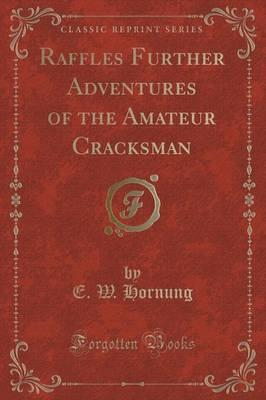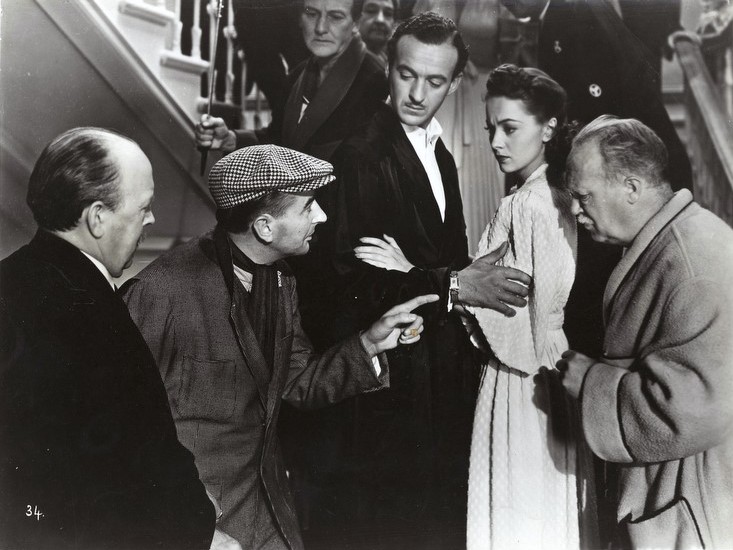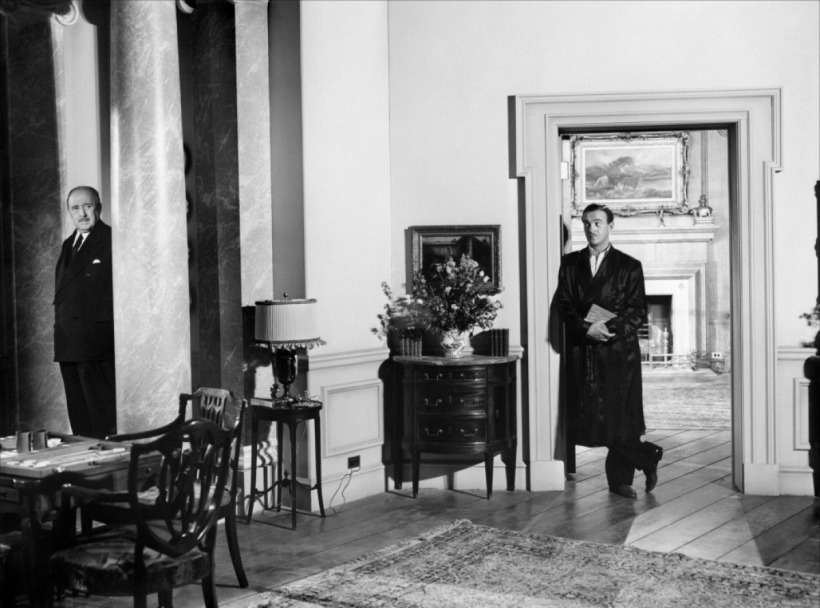What’s wrong with Olivia de Havilland and me?
I don’t know – probably it’s all those movies with Erroll Flynn, but lovely de Havilland is one of those actresses that are a delight to watch, but for the life of my I never remember when it comes the time to make a list of the favorites.

But that’s ok, anyway, because this is The Olivia de Havilland Centenary Blogathon, organized by the In the good old days of Hollywood blog and the Phyllis Loves Classic Movies blog – and you should follow the link and go there to check out the other entries in this blogathon.
Here on Karavansara, we’ll spend some time with Raffles – the amateur cracksman.
 Arthur J. Raffles, “the amateur cracksman” was the invention of E.W. Hornung, Arthur Conan Doyle’s brother-in-law.
Arthur J. Raffles, “the amateur cracksman” was the invention of E.W. Hornung, Arthur Conan Doyle’s brother-in-law.
With Conan Doyle stories, the Raffles stories shared a structure (we have a not-too-bright chronicler in the shape of Harry “Bunny” Manders), shared a venue (the Raffles stories appeared in The Strand Magazine) and indeed their success – Raffles being considered the second most popular fictional character to appear on The Strand, second only to Sherlock Holmes.
Also, both Raffles and Holmes were killed-off by their authors, only to return for the reading public’s pleasure.
In case you are interested, the stories can be found in various formats, for free, on the Project Gutenberg pages.
Raffles is a criminal, an anti-hero, and also one of the first specimens of that typicallyBritish sort of characters – the bored gentleman ready to do anything for kicks.
Bulldog Drummond and The Saint come to mind.
Written between 1898 and 1909, Raffles – a suave gentleman-thief that basically robs jewelers for the heck of it – was a hit with the readers, and his adventures were transferred on the big screen for the first time in 1905.
In 1917, it was John Barrymore that portrayed the character, while in 1930 the role went to Ronald Colman.
Then, finally, in 1939, for the seventh adaptation of Raffles’ adventures, the part went to David Niven.
It was the most perfect of casting choices – even if the original choice had been Cary Grant.
Casting changes were, on the other hand, the order of the day – Bette Davis was the original choice for the part of Gwen, who in the end went to Olivia de Haviland.

The plot in a nutshell – cricketer, gentleman-about-town and cracksman Raffles is causing no end of trouble foro Scotland Yard, but his days as criminal are numbered: having decided to marry the beautiful Gwen, Raffles is about to retire.
But a friend is in dire need for cash, the police have a new lead, and a weekend in the country might turn into a trap for Raffles.
Legend holds that Francis Scott Fitzgerald had a go at the script of the movie. While this remains unconfirmed, certainly the story is played with wit and elegance, and as complications pile up, pushing Raffles in what looks like a very tight corner, the plot unfolds smoothly.
The character of Gwen, in particular, turns from a rather conventional ornament in part one to an active role in the second half of the movie.

This being a Hollywood movie of the 1930s, crime cannot go unpunished – and the finale has Raffles cheerfully accepting the fact that he will go in the slammer… maybe. But love triumphs anyway.
On a technical curiosity, the chief of the London police, in the movie, has a TV set to watch cricket games in his office – a true cutting edge device, in 1939.
Raffles is a good thriller, with a well-designed plot, fine dialogs, and an excellent cast. E.E. Clive is wonderful in the small but amusing role of Barraclough the butler.
And for a change, this is a caper movie in which the police is not portrayed as a collection of idiots, but poses a real threat to the plans and freedom of Raffles himself.
The movie was shot in 1939 – it should have been filmed on location, but the war in Europe forced Samuel Goldwin to change his plans. Also, Niven worked overtime because he was expected to join his regiment in Europe – he was given 21 days of special leave to finish the shooting.
If there is one thing missing in the movie is the original attitude of Hornung, that often used his stories to discuss issues of class or economical divisions within the British society.
In this, Raffles is a rather “American” movie – the upper class are harmless and basically silly, the lower classes are unworthy of trust, and only the middle class (of which Raffles is an elegant member) is worth its salt.
But all in all, this is an excellent entertainment, a good caper movie with a wonderful David Niven and an unexpectedly effective de Havilland.

Pingback: THE OLIVIA DE HAVILLAND CENTENARY BLOGATHON HAS FINALLY ARRIVED – In The Good Old Days Of Classic Hollywood.
2 July 2016 at 19:47
Watched this movie this morning for the first time 🙂 I will definately check out the original stories! It’s funny, I thought of Cary Grant multiple times while watching! It would be interesting to see how Davis would have played it. I’m glad Olivia’s role was made stronger in the second half. I think it could have been a little longer though. I thought the tv was interesting too!!
Thanks for contributing to the Blogathon with this film! I enjoyed reading it!
LikeLiked by 1 person
2 July 2016 at 19:56
Thank you!
I’m not sure Cary Grant would have cut it – Niven is absolutely perfect, with that slightly embarrassed attitude, like he really feels he’s in the wrong place. And I agree that Davis would have made for a quite different Gwen.
As for the length, I think they had to cut it short because Niven was leaving for the front and all that. Indeed, fifteen minutes more would have been fun… 🙂
LikeLike
2 July 2016 at 21:36
I’ve read one or two of the stories and would love to see this version – Niven sounds like perfect casting opposite de Havilland. Enjoyed your piece!
LikeLiked by 1 person
2 July 2016 at 23:43
Thanks!
The stories are quite fun – and the movie gets the spirit and the style just right.
LikeLiked by 1 person
3 July 2016 at 06:13
Hi Davide. Good write-up. Raffles was remarkably popular for a time and then utterly forgotten Part of the problem might be the nickname, which sounds funny to Americans.
LikeLiked by 1 person
3 July 2016 at 08:34
Thanks!
Never thought about that… but now that you mention it,I think I remember parodies playing on the “silly” name.
LikeLike
3 July 2016 at 23:19
I’d heard of these movies and stories, but never really knew what they were about! Thanks for this great post — I will have to try to track this down, and try some of the stories too.
LikeLike
3 July 2016 at 23:30
Happy to be of assistance.
The movie is available on the Internet Archive, if I am not mistaken, and the stories can be downloaded from the Gutenberg project (or can be found in a variety of cheap printed editions).
Happy reading – and watching!
LikeLike
4 July 2016 at 22:48
Thanks for the tip re: the online Raffles stories. I’ve not read the stories, nor have I seen this film, so I’ve got lots of catching up to do in both areas! 😉 I’m looking forward to watching this film during our next rainy evening.
LikeLike
4 July 2016 at 22:52
Have fun!
LikeLiked by 1 person
4 July 2016 at 22:58
I am now very glad that I dvred this one. Going to watch it soon-thanks for the overview!
LikeLike
4 July 2016 at 23:00
You are welcome!
Happy watching!
LikeLiked by 1 person
5 July 2016 at 21:23
Thanks for joining in on the blogathon with a film that is new to me. Now I need to check it out. I enjoyed your post. Don’t forget to read my entry for the blogathon
https://crystalkalyana.wordpress.com/2016/07/05/happy-100th-birthday-olivia-de-havilland/
LikeLiked by 1 person